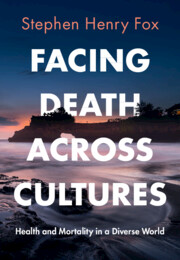Book contents
- Facing Death Across Cultures
- Facing Death Across Cultures
- Copyright page
- Dedication
- Contents
- Figures
- Tables
- Acknowledgments
- Introduction to a Cultural Species
- Module 1 The Basic Psychological Components of Culture
- Module 2 Becoming Human
- Module 3 Acculturation
- Module 4 Multicultural Adaptation
- Module 5 Health and Well-Being
- Module 6 Disease and Healing
- Module 7 Diversity and the Conventional Medical World
- Module 8 Thinking about Death
- Module 9 Managing Mortality and Difficult Passages
- Module 10 Cultures Approach the End
- Module 11 Critical and End-of-Life Care
- Module 12 Culture, Passages, and Psychosocial Supports
- Glossary
- References
- Index
Module 10 - Cultures Approach the End
Published online by Cambridge University Press: 20 February 2025
- Facing Death Across Cultures
- Facing Death Across Cultures
- Copyright page
- Dedication
- Contents
- Figures
- Tables
- Acknowledgments
- Introduction to a Cultural Species
- Module 1 The Basic Psychological Components of Culture
- Module 2 Becoming Human
- Module 3 Acculturation
- Module 4 Multicultural Adaptation
- Module 5 Health and Well-Being
- Module 6 Disease and Healing
- Module 7 Diversity and the Conventional Medical World
- Module 8 Thinking about Death
- Module 9 Managing Mortality and Difficult Passages
- Module 10 Cultures Approach the End
- Module 11 Critical and End-of-Life Care
- Module 12 Culture, Passages, and Psychosocial Supports
- Glossary
- References
- Index
Summary
Module 10 begins to discuss more specific parameters of culture in approaches to death. Humans desperately need to make sense of an unpredictable world, including death and the potential to predict its arrival. While it is unlikely that portents or premonitions will predict demise, we look to doctors to make accurate forecasts, though this is also murky territory and terminologies are inexact. Where one dies may be of great cultural importance and some have definite expectations about who provides care. Who makes decisions becomes important, affecting continuation of treatment and entry into end-of-life care; advance directives may clarify these issues, if people are open to them. End-of-life care such as hospice is most congruent with Euro-American ethnicities and is underutilized by other groups. People begin to find solace in cultural traditions as they near the end.
- Type
- Chapter
- Information
- Facing Death Across CulturesHealth and Mortality in a Diverse World, pp. 194 - 209Publisher: Cambridge University PressPrint publication year: 2025

